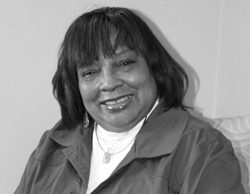Remembering Scharron Clayton

Scarron Clayton was 70 when she passed away. Clayton came to UNI in 1991.
Aug 31, 2017
Scharron Clayton, associate professor of ethnic and cultural studies, passed away on June 11 of this year at the age of 70. According to the UNI website, Clayton was an educator for 45 years and was well known on campus and in the community for her dedication to education about African-American culture, philosophy and religion.
According to Jerome Soneson, head of the department of philosophy and world religions, Clayton came to UNI in 1991 as assistant dean of the College of Humanities and Fine Arts.
Clayton taught numerous courses within the humanities, but her focus was on African-American culture and social justice. According to Soneson, Clayton taught Malcolm, Martin and Justice, a course centered on social justice and its relationship to the African-American community. Clayton also taught Black Liberation and the Black Church, Black Women in America: Challenge, Spirit, Survival, Images of Blacks in the White Mind and Culture and Philosophy of African-American life.
“She was the leading figure on campus to teach our students about African-American culture, philosophy and religion,” Soneson said. “This is a significant contribution to the whole university.
“There is a vast hole within the teaching faculty for teaching about African-American life,” Soneson said. “Scharron was the last person here sort of holding the fort, if you will, and now she is gone.”
“With her loss, is loss not just as a faculty member, but as a voice that was able to introduce to our students across campus…something about the history and culture, the religion and the philosophy of African-American life,” Soneson said.
According to Soneson, Clayton’s influence and impact expanded far beyond the classroom as well, echoing out to Waterloo and the minds of the wider community.
“She was just a wonderful colleague,” said Martha Reineke, professor of religion. “She was a very important person in the lives of so many people. She was a mentor to so many persons on campus: staff, faculty and students.
“She taught a number of courses in our department that enabled her to share [her] knowledge base with students,” Reineke said. “On a campus where the student population is predominantly white, and where many students, sadly, haven’t had courses in high school in African-American history and culture, she presented opportunities that were unique on campus.
“She always created a comfortable, safe environment where students felt able to ask questions and discuss topics that may previously have made them uncomfortable,” Reineke said.
According to Reineke, Clayton was also heavily involved in the community, specifically through her work at the radio station KGGB in Waterloo.
“[KGGB] was basically the voice of the African-American community,” Reineke said. “She would bring people together through that radio show to discuss current events and pressing community issues. She was highly regarded in the community for her leadership.”
According to Reineke, Clayton gave community members a platform to discuss community issues and reflect on the thoughts of others on the issues.
“It was like a town hall on the radio,” Reineke said.
Helen Harrington, secretary of the department of philosophy and world religions, discussed how much of a presence Clayton was in the department and on-campus.
“I look forward to coming [to work] every day,” Harrington said. “But Tuesdays and Thursdays were always special, because those were the days she taught and we would get in here right at 8 o’clock and she’d have a seat and we would talk about the world. We could solve all the problems in the world.
“We had the answers; if they would just listen to us, we knew what to do,” Harrington said. “I looked so forward to those talks we had every Tuesday and Thursday, and that’s what I miss.”








